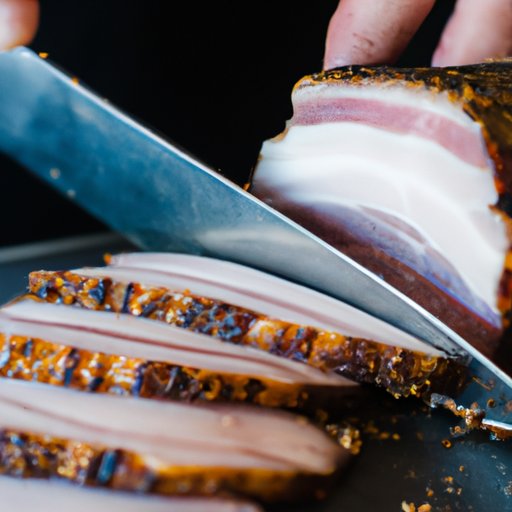
Introduction
If you love BBQ, chances are you’ve encountered brisket at some point. This mouth-watering cut of meat can be a showstopper when done right – but getting the slicing just right can be a daunting task. In this article, we’ll take you through everything you need to know to slice brisket like a pro. From the right knife to alternative slicing techniques, we’ve got you covered.
A Step-by-Step Guide
The first step in achieving perfect brisket slices is choosing the right knife. A sharp, long-bladed carving knife is your best bet, although a slicing knife can also work well. Once you have your knife, it’s time to prepare the brisket. Trim any excess fat and season it to your liking.
When it comes to slicing, start by positioning the brisket with the fat cap facing up. Make the first cut, slicing through the fat cap and down to the meat. Then, slice against the grain, using a sawing motion. Keep your slices consistent in size and thickness. As you get towards the end of the brisket, adjust your grip to ensure you’re slicing evenly.
Throughout the slicing process, keep in mind the importance of cutting against the grain. This helps to ensure that each slice is tender and easy to chew.
Best Practices
To get the most out of your brisket, it’s important to maintain the right temperature throughout the cooking and slicing process. Keep your brisket warm (but not too hot) to ensure that it’s easy to slice.
Another key aspect of brisket slicing is the angle and direction of your cuts. Aim to slice your brisket at a slight angle, which helps to produce wider slices with more surface area. Be sure to slice from end to end rather than starting in the middle, as this can make it difficult to maintain a consistent thickness.
Finally, be sure to adjust the size and thickness of your slices to suit your tastes. Some prefer thicker slices, while others like them thin and delicate. Experiment to find what works for you, and don’t be afraid to adjust your approach over time.
Alternative Techniques
If you’re looking to switch things up a bit, there are a few alternative brisket slicing techniques out there that can produce some stunning results. One example is Texas-style slicing, which involves slicing the brisket across the entire length rather than just the flat. This approach can result in a more consistent texture throughout the meat, making it a great choice for sandwiches or tacos.
Another popular technique is the burnt ends technique, in which you slice off the crispy, fatty ends of the brisket and serve them as bite-sized pieces. This technique is a great way to impress guests with your BBQ prowess and can be a fun alternative to traditional slicing.
Expert Insights
For those who want to take their brisket slicing to the next level, there’s no substitute for learning from the pros. We chatted with a few experienced pitmasters and BBQ chefs to get their take on the best techniques for slicing brisket.
One common piece of advice? Let your brisket rest before slicing. “Resting the brisket uncut for about 30 minutes to 1 hour allows the juices to settle in,” says BBQ expert Chris Hart. “This makes it easier to slice and it ensures your brisket doesn’t dry out.”
Another tip from pro pitmaster Aaron Franklin: “Don’t be afraid to adjust your slice angle depending on the meat. Each brisket is going to be a little different, so practice and be open to making adjustments as needed.”
Scoring and Serving
Finally, when it comes to serving your brisket, there are a few simple things you can do to up your presentation game. One example is scoring the fat cap – this involves slicing shallow cuts into the fat cap in a decorative pattern. Not only does this add visual interest, but it also makes it easier to slice through the fat during serving.
When it’s time to serve, arrange your brisket slices in an appealing pattern. You can serve on a platter or arrange slices in individual portions. Don’t forget to garnish with fresh herbs or a sprinkling of BBQ rub for a finishing touch.
Conclusion
Slicing brisket doesn’t have to be intimidating – with the right technique and a little practice, anyone can produce beautiful, tender slices every time. Remember to choose the right knife, slice against the grain, and experiment with alternative techniques to find what works for you.





